Act I
Three witches appear and describe their evil deeds. When they hear a drum heralding Macbeth’s approach, they break into dance and song. Macbeth and Banco, two generals in Duncan’s army, arrive. The witches greet Macbeth as Thane of Glamis, Thane of Cawdor and King of Scotland; they hail Banco as the father of future kings. Messengers arrive to announce the fulfillment of the first prophecy. To Banco’s alarm, Macbeth reflects on gaining the throne. Lady Macbeth reads a letter from Macbeth telling her of his victory in battle and of the witches’ prophecy. She revolves to help him fulfil it. When a messenger announces that the King is on his way to the castle with Macbeth, she realises they must act that night and calls on the powers of evil to help her. Macbeth appears, and husband and wife quickly agree to the murder. King Duncan and his retinue arrive. A vision of a dagger prompts Macbeth to go and kill Duncan. But when he returns, wracked with remorse, his wife accuses him of cowardice. She snatches the dagger and goes off to the King’s rooms to incriminate the guards, returning with bloody hands to her now guilt-stricken husband. Macduff and Banco appear. While Macduff goes to wake the King, Banco reflects on the stormy night. Macduff discovers the murder and wakes the house. Everyone vows vengeance on the unknown assassin.
Act II
Macbeth is now King of Scotland and Duncan’s son Malcolm, blamed for his father’s death, has fled to England. Because the witches prophesied that Banco would be a father of kings, Macbeth and his wife now plot to kill him and his sons; Lady Macbeth is triumphant… Assassins in Macbeth’s service wait for Banco in the dark. He and his son Fleanzio arrive, Banco uneasy with foreboding. Banco is murdered but his son escapes.
Macbeth and his queen welcome guests to a feast and she proposes a toast. An assassin arrives and tells Macbeth what has happened in the park. Macbeth offers an explanation for Banco’s absence, but when he goes to sit down he sees the ghost of Banco. Lady Macbeth tries to calm her husband and the troubled guests. The ghost reappears and Lady Macbeth is unable to control her demented husband. The Scottish nobles fear their land is now in the grip of criminals and Macduff decides to join the exiles.
Act III
On a stormy night the witches invoke evil spirits as they brew their magic potions. Macbeth arrives and asks them to prophesy his destiny. In response they conjure up three apparitions who, in turn, warn him to beware of Macduff, that he need fear ‘none born of woman’, and that he will invincible until Birnam Wood marches on his castle. The witches then summon the apparition of eight kings who pass Macbeth, followed by Banco carrying a mirror. Terrified, Macbeth recognises them as Banco’s descendants. Macbeth faints and the witches dance round him, then disappear. Recovering, he vows to destroy Macduff and his family.
Act IV
Scottish refugees lament the suffering of their oppressed homeland and its wretched people. Macdufff is distraught at the news of his wife’s and children’s murders. Malcolm arrives, leading a troop of English soldiers, and urges Macduff to find comfort in exacting revenge. Malcolm rallies the refugees to join forces in attacking Macbeth, using branches from the wood as camouflage.
Lady Macbeth, who has taken to sleepwalking, describes and relives the atrocities she and her husband have committed. Macbeth, in desperation, awaits the advancing troops and reflects on his impending downfall. He is so distraught that he fails to react to the news of his wife’s death. When soldiers announce that Birnam Wood is on the move, he recalls the witches’ prophecy. A bare field. English soldiers carrying branches are advancing. Macbeth appears, pursued by Macduff. The other two prophecies are now fulfilled: Macduff reveals that he was not born naturally but surgically removed from his mother’s womb; in the ensuing fight Macbeth falls to Macduff’s sword. Malcolm is proclaimed King.
Place: Scotland
Time: 11th century
Act 1
Scene 1: A heath
Groups of witches gather in a wood beside a battlefield, exchanging stories of the "evils" they have done. The victorious generals Macbeth and Banco enter. The witches hail Macbeth as Thane of Glamis (a title he already holds by inheritance), Thane of Cawdor, and king "hereafter." Banco is greeted as "lesser than Macbeth, but greater", never a king himself, but the progenitor of a line of future kings. The witches vanish, and messengers from the king appear naming Macbeth Thane of Cawdor. Macbeth protests that the holder of that title is still alive, but the messengers reply that the former Thane has been executed as a traitor. Banco, mistrusting the witches, is horrified to find that they have spoken the truth. In a duet, Macbeth and Banco muse that the first of the witches' prophecies has been fulfilled. Macbeth ponders how close he is to the throne, and whether fate will crown him without his taking action, yet dreams of blood and treachery: while Banco ponders on whether the minions of Hell will sometimes reveal an honest truth in order to lead one to future damnation.
Scene 2: Macbeth's castle
Lady Macbeth reads a letter from her husband telling of the encounter with the witches. She is determined to propel Macbeth to the throne - by fair means or foul.
Lady Macbeth is advised that King Duncan will stay in the castle that night; she is determined to see him killed (Or tutti, sorgete / "Arise now, all you ministers of hell"). When Macbeth returns she urges him to take the opportunity to kill the King. The King and the nobles arrive and Macbeth is emboldened to carry out the murder (Mi si affaccia un pugnal? / "Is this a dagger which I see before me?"), but afterwards is filled with horror. Disgusted at his cowardice, Lady Macbeth completes the crime, incriminating the sleeping guards by smearing them with Duncan's blood and planting on them Macbeth's dagger. Macduff arrives for an appointment with the King, while Banco stands guard, only for Macduff instead to discover the murder. He rouses the castle while Banco also bears witness to the fact of Duncan's murder. The chorus calls on God to avenge the killing (Schiudi, inferno, . . / "Open wide thy gaping maw, O Hell").
Act 2
Scene 1: A room in the castle
Macbeth is now king: Duncan's son Malcolm has fled the country, suspicion having conveniently fallen on him for his father's murder: but Macbeth is still disturbed by the prophecy that Banco, not he, will found a great royal line. To prevent this he tells his wife that he will have both Banco and his son murdered as they come to a banquet.
Scene 2: Outside the castle
A gang of murderers lie in wait. Banco, sensing danger shares his misgivings with his son. (Come dal ciel precipita / "O, how the darkness falls from heaven"). The murderers attack and stab him to death, but his son escapes.
Scene 3: A dining hall in the castle
Macbeth receives the guests and Lady Macbeth sings a brindisi (Si colmi il calice / "Fill up the cup"). The assassination is reported to Macbeth, but when he returns to the table the ghost of Banco is sitting in his place. Macbeth raves at the ghost and the horrified guests believe he has gone mad. Lady Macbeth manages to calm the situation once - and even mocks it by calling for a toast to the absent Banco (whose death is not yet public knowledge), only for the ghost to appear a second time and terrify Macbeth into insanity again. Macduff resolves to leave the country, saying it is ruled by a cursed hand and only the wicked may remain: the other guests are terrified by Macbeth's talk of ghosts, phantoms and witches. The banquet ends abruptly with their hurried, frightened departure.
Act 3
The witches' cave
The witches gather around a cauldron in a dark cave. Macbeth enters and they conjure up three apparitions for him. The first advises him to beware of Macduff. The second tells him that he cannot be harmed by a man 'born of woman'. The third that he cannot be conquered till Birnam Wood marches against him. (Macbeth: O lieto augurio / "O, happy augury! No wood has ever moved by magic power")
Macbeth is then shown the ghost of Banco and his descendants, eight future Kings of Scotland, verifying the original prophecy. (Macbeth: Fuggi regal fantasima / "Begone, royal phantom that reminds me of Banco"). He collapses, but regains consciousness in the castle.
The act ends with Macbeth recovering and resolving to assert his authority: Vada in fiamme, e in polve cada / "Macduff's lofty stronghold shall / Be set fire....".
Act 4
Scene 1: Near the border between England and Scotland
Scottish refugees stand near the English border (Chorus: Patria oppressa / "Down-trodden country"):
While each version uses the same libretto, the music of this chorus is different. It begins with a less ominous, much shorter orchestral introduction and is sung straight through by the entire chorus.
In the distance lies Birnam Wood. Macduff is determined to avenge the deaths of his wife and children at the hands of the tyrant (Ah, la paterna mano / "Ah, the paternal hand"). He is joined by Malcolm, the son of King Duncan, and the English army. Malcolm orders each soldier to cut a branch from a tree in Birnam Wood and carry it as they attack Macbeth's army. They are determined to liberate Scotland from tyranny (Chorus: La patria tradita / "Our country betrayed").
Scene 2: Macbeth's castle
A doctor and a servant observe the Queen as she walks in her sleep, wringing her hands and attempting to clean them of blood (Una macchia è qui tuttora! / "Yet here's a spot"). She raves about the deaths of both Duncan and Banco, and even about the deaths of Macduff's family, and that all the perfumes of Arabia would not clean the blood off her hands: all are things that the horrified witnesses would never dare to repeat to any living man.
Scene 3: The battlefield
Macbeth has learned that an army of Scottish rebels backed by England is advancing against him, but is reassured by remembering the words of the apparitions, that no man born of woman can harm him. However, in an aria (Pietà, rispetto, amore / "Compassion, honour, love") he contemplates the fact that he is already hated and feared: there will be no compassion, honour and love for him in his old age even if he wins this battle, nor kind words on a royal tomb, only curses and hatred. He receives the news of the Queen's death with indifference. Rallying his troops he learns that Birnam Wood has indeed come to his castle. Battle is joined.
Macduff pursues and fights Macbeth who falls. He tells Macbeth that he was not "born of woman" but "ripped" from his mother's womb. Fighting continues. Mortally wounded, Macbeth, in a final aria - Mal per me che m'affidai / "Trusting in the prophecies of Hell" - proclaims that trusting in these prophecies has caused his downfall. He dies on stage, while Macduff's men proclaim Malcolm to be the new King.


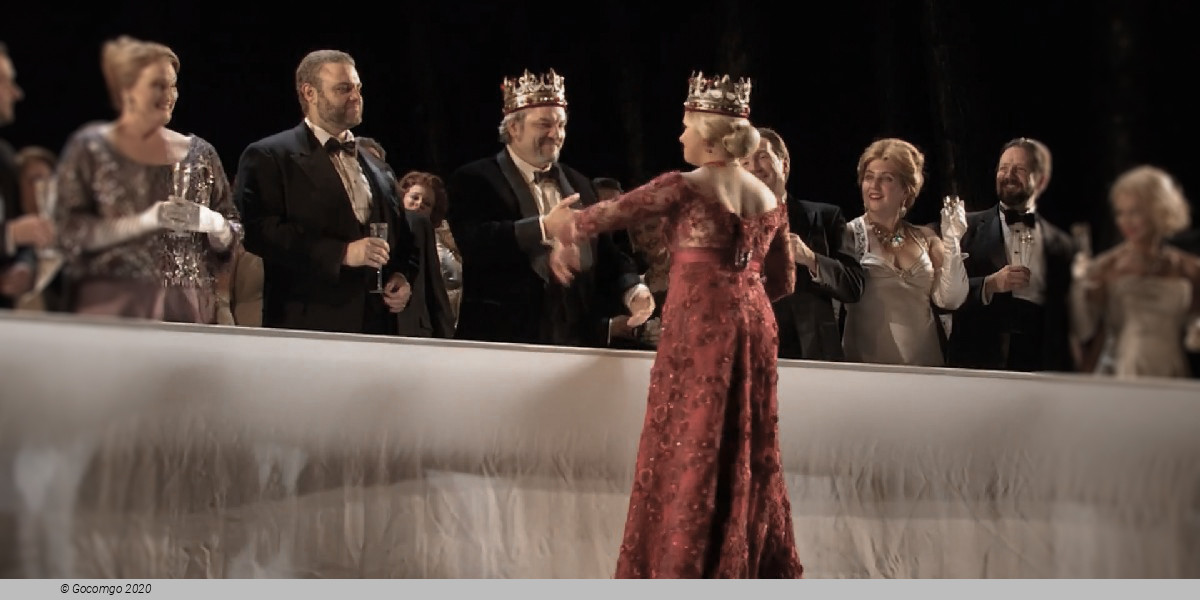
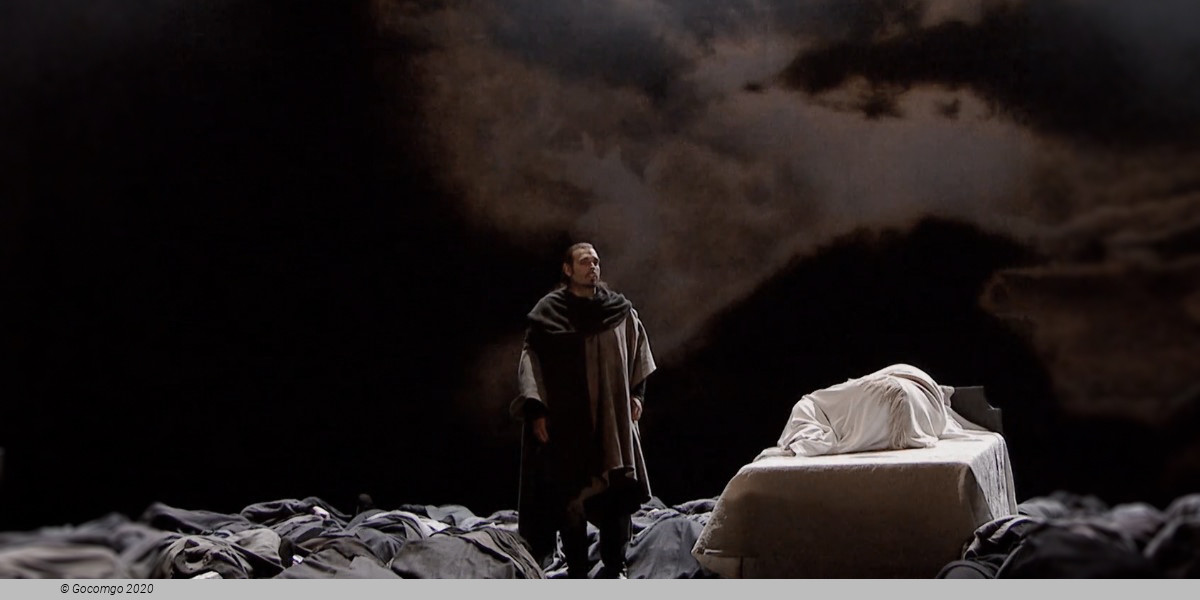
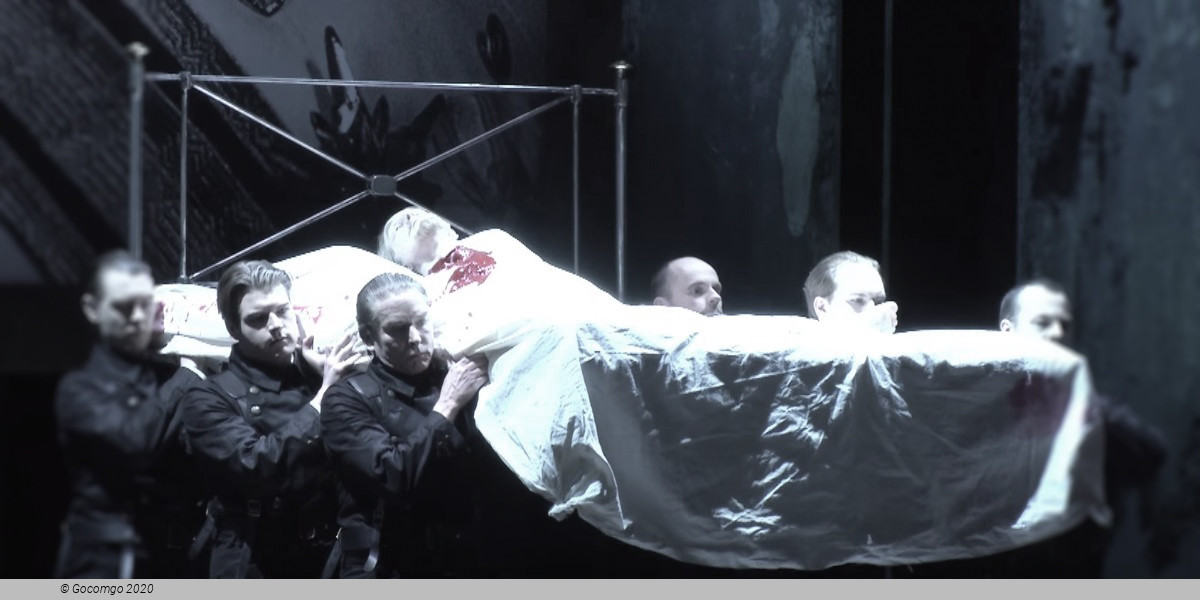
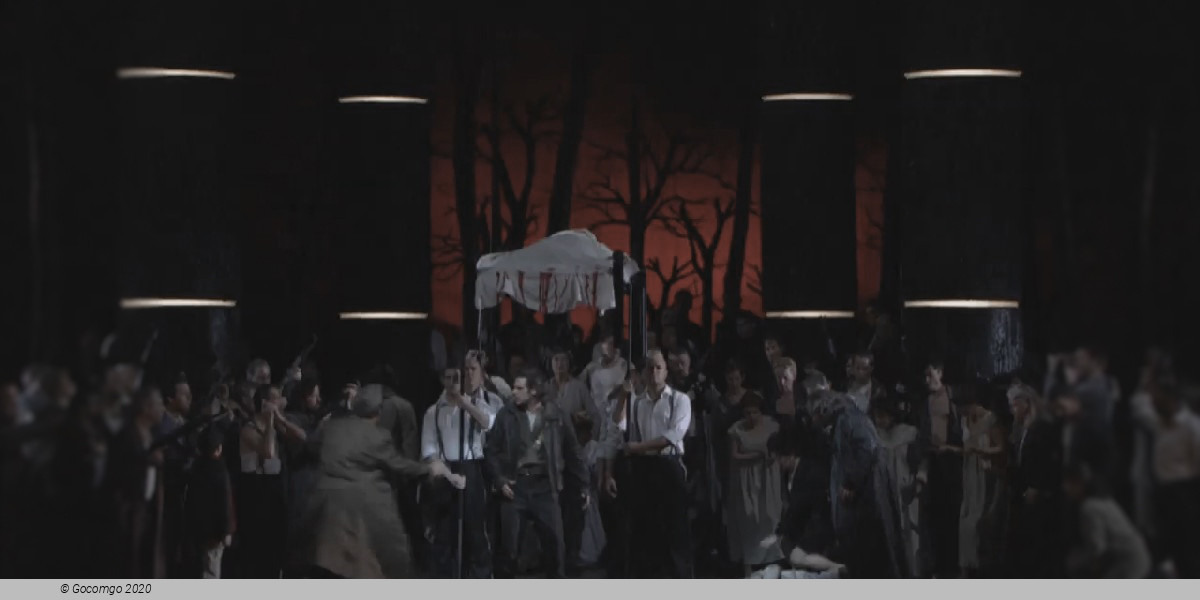
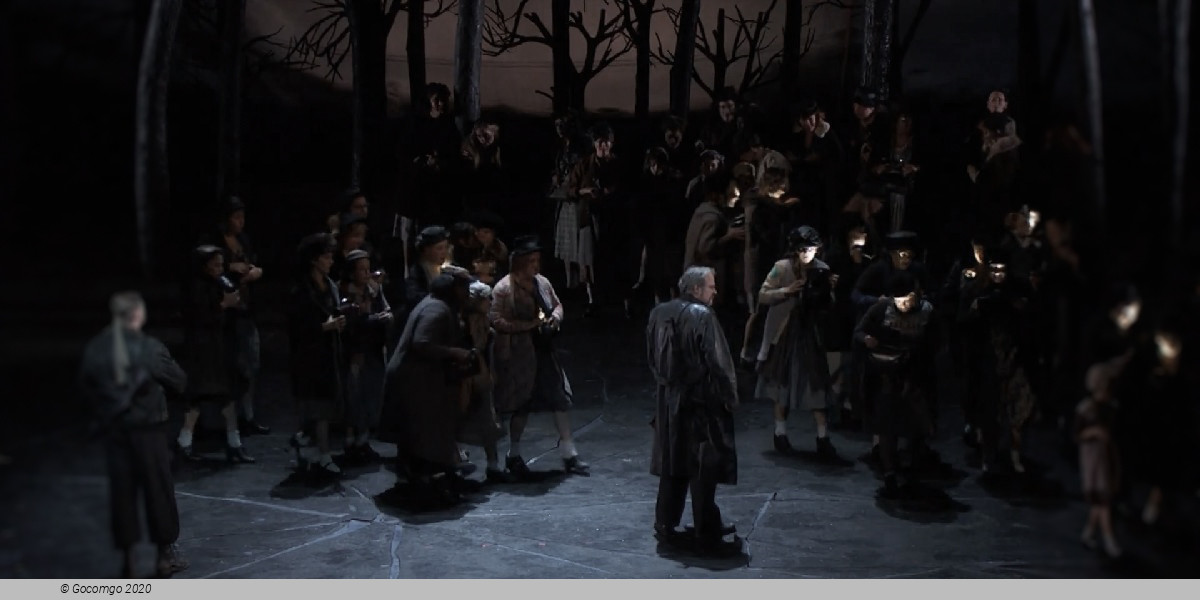
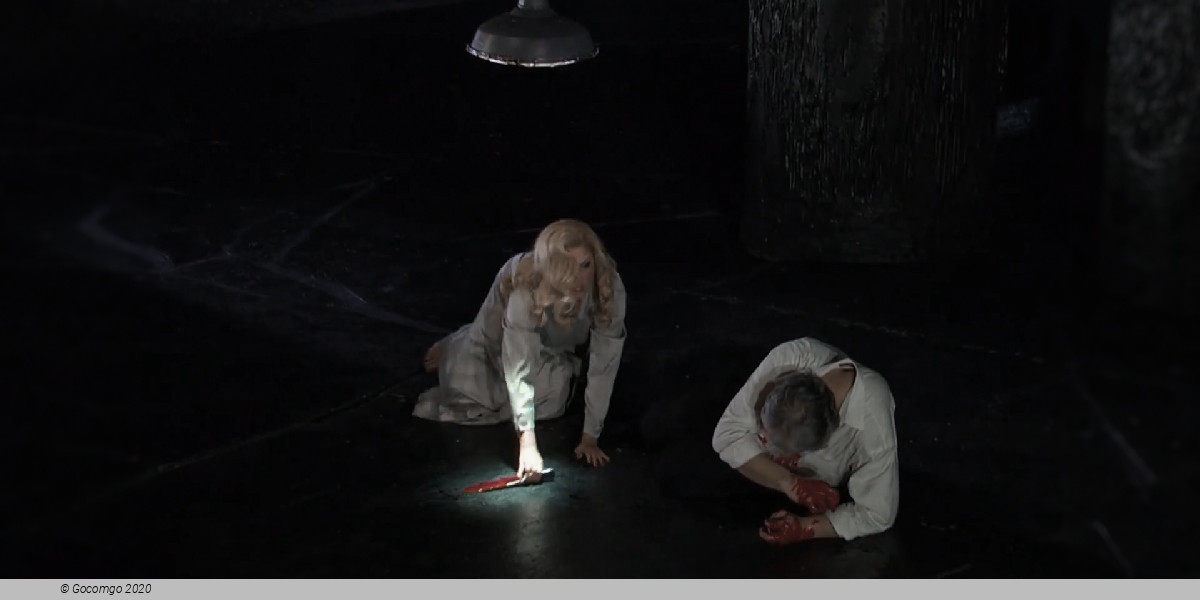
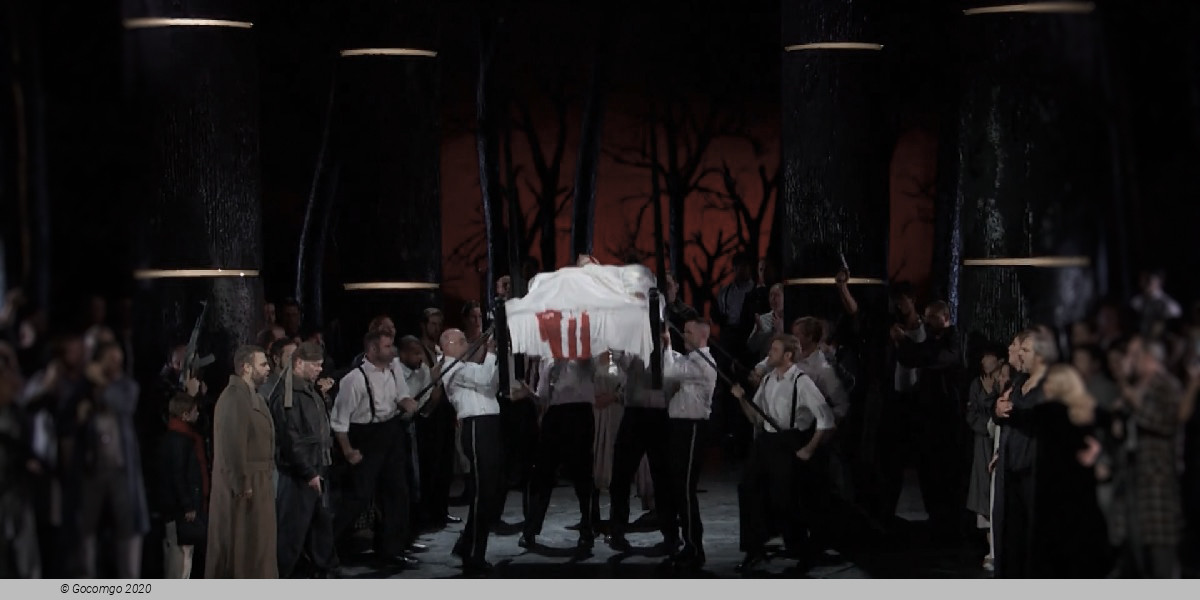
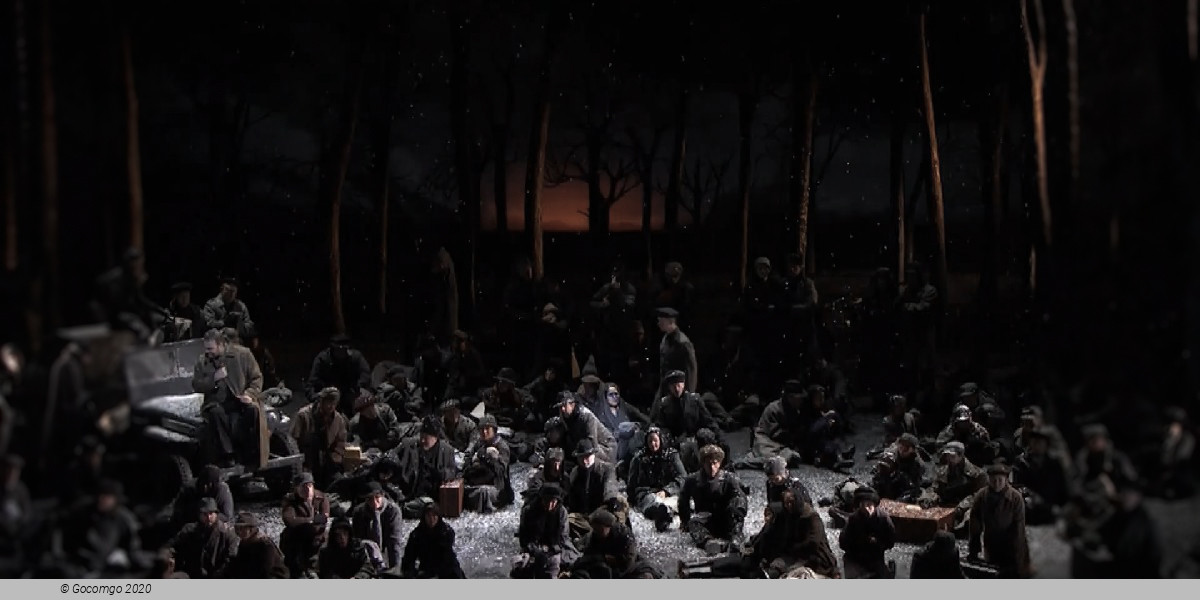
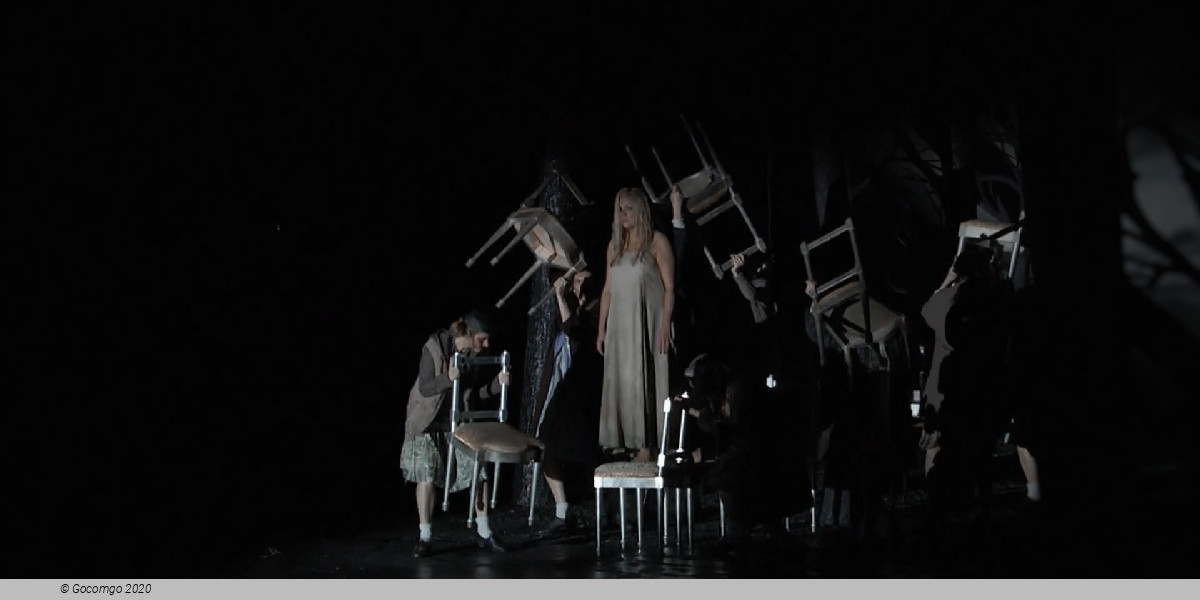
 1 Theatre Square
1 Theatre Square